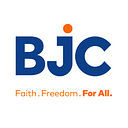Juneteenth and the Promise of Religious Freedom
By 2017 BJC Fellow Kathryn Freeman
The First Amendment to the U.S. Constitution says, “Congress shall make no law respecting an establishment of religion or prohibiting the free exercise thereof.” But, for 256 years the promise of religious freedom — like the promises of life and liberty enshrined in the Declaration of Independence — remained an elusive fact for millions of enslaved Africans in this country. On June 19, 1865, Union soldiers informed the enslaved Africans in Texas that “all slaves were free.” Juneteenth is the annual commemoration of General Order 3 and with it, freedom.
“The United States is a nation founded on both an ideal and a lie,” wrote Nikole Hannah-Jones in her introductory essay to the Pulitzer Prize-winning 1619 project from The New York Times. The Founders are venerated for their revolutionary ideas about freedom and democracy, yet at our nation’s founding those ideas were limited in scope — white, male, landowner.
The Founders fought to ensure the religious tyranny and persecution that hounded them in Europe did not threaten their worship in their infant democracy, but the promise of religious freedom in the First Amendment did not extend to the worship practices of the enslaved. Many Colonial slaveholders refused to allow the enslaved to be baptized, fearing traditional British law against the enslavement of Christians would require them to free those they considered property.
After slave rebellions led by preachers like Nat Turner and Denmark Vesey, slaveholders prohibited worship services or closely monitored the preachers and their sermons to ensure they were not encouraging discontent and rebellion. Slaveholders removed whole sections of the Old Testament that called for liberation for the enslaved from the Bible, such as the book of Exodus. In his book Slave Religion: The “Invisible Institution” in the Antebellum South, Dr. Albert Raboteau, one of our country’s pre-eminent religion scholars, tells some of the stories. Just one involves Moses Grandy, an enslaved man who said his brother-in-law Isaac, an enslaved preacher, was “flogged, and his back pickled” for preaching at a secret worship service in the woods.
White supremacy has always been a deadly threat for Black bodies, but it has been a threat to Black religious freedom, too. Even with the passage of the 13th and 14th amendments, which limited slavery and extended full citizenship rights to African Americans, the threat to Black religious freedom remained — four little girls in Birmingham in 1963, eight parishioners and their pastor at a Bible Study in 2015, and countless church burnings in between. Because the historic Black church gave us a sense of self-worth, taught us about God our liberator, and gave us the tools to resist, it was — and remains — a threat. Historically, our freedom to worship has been crucial to our ability to resist the evils of white supremacy and systemic racism in this country.
This might be why, despite accounted for only in relation to the slave trade, possibility of escape, and counted as only three-fifths a person, African Americans believe deeply in the freedoms enshrined in the Constitution.
In making his appeal for abolition, Frederick Douglass staked his claim firmly both in the natural law and the Constitution:
“Let us approach the Constitution…and instead of finding in it a warrant for the stupendous system of robbery, comprehended in the term slavery, we shall find it strongly against that system. …We, the people — not we, the white people — not we, the citizens or the legal voters — not we the privileged class … but we, the people — the men and women, the human inhabitants of the United States.”
The Rev. Dr. Martin Luther King Jr., in his famous “I Have a Dream” speech, demanded civil rights for African Americans make good on the Constitution’s promissory note of freedom:
“In a sense we’ve come to our nation’s capital to cash a check. When the architects of our republic wrote the magnificent words of the Constitution and the Declaration of Independence, they were signing a promissory note to which every American was to fall heir. This note was a promise that all men, yes, Black men as well as white men, would be guaranteed the unalienable rights of life, liberty, and the pursuit of happiness.”
African Americans have always understood the importance of the promises of the Constitution — the freedom to assemble meant Southern Blacks could join the NAACP without fear of losing their jobs; the freedom to vote meant Fannie Lou Hamer could challenge the president on national TV; the freedom to worship meant the ability to mobilize parishioners to serve the poor, transform communities, and get souls to the polls. The Constitution gave power to our dreams for ourselves and our futures.
Juneteenth is the day the nation our Framers envisioned was born. It was our country’s first true steps toward what Rep. Barbara Jordan called “an America as good as its promise.” Juneteenth is a holiday for all of us, because as the last of the formerly enslaved were freed from their bondage, they began making their way as perfecters of this union.
Their fight, our fight, remains to make true the words of that revolutionary document, “We hold these truths to be self-evident, that all men are created equal, that they are endowed by their Creator with certain unalienable Rights, that among these are Life, Liberty and the pursuit of Happiness.”
Kathryn Freeman is a 2017 BJC Fellow and an attorney who lives in Texas. She co-hosts the Melanated Faith podcast.
This article is part of the Faith Freedom 2020 collaboration. See other resources at FaithFreedom2020.org.
